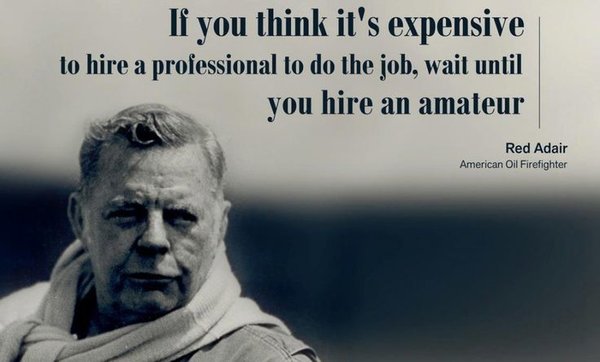I love this quote that I have shamelessly paraphrased in the headline here. Red Adair was a larger-than-life character who built his reputation successfully putting out oil well fires. This is a highly dangerous and incredibly lucrative occupation.
Imagine an oil well producing thousands of barrels of oil, suddenly erupting into flames? It is literally millions of dollars going up in smoke.
Now I am not for a minute suggesting what we do as marketing management consultants is anywhere near as dramatic or a dangerous as Red Adair and his oil fire fighting business, but I think there are some key examples of where in marketing management an expensive professional provides more value than a low cost amateur.
Choosing a professional versus an amateur
The easiest thing in the world is for someone to become a marketing consultant. As Professor Mark Ritson recently questioned, why is it possible to be a marketing expert without any formal qualification?
To become a marketing-consultant is even easier. You simply hang up a shingle and hope that either your work experience or reputation is enough to get you consulting projects and build a business.
Because of the low barrier to entry, many people become marketing consultants because they are currently not working in a fulltime job and it is a convenient way to earn an income until you land that next fulltime gig. You can see this behaviour in the LinkedIn profiles of many marketers who have short bursts of consulting interspersed with fulltime marketing positions.
When I made the decision in 1999 to start TrinityP3 (or P3 as it was then) as a marketing management consultancy it was with the clear vision to build a consulting business that acted as an independent advisor to advertisers and marketers on the issues around agency selection, remuneration and performance and relationship management.
This was not simply a thing I did while waiting for another opportunity to turn up. It was a very deliberate decision to leave the agency world as a creative director and create a brand and professional consulting business.
At the time almost all of the consultants working in the local market were one or two person operations, with none really providing a business model to be copied. Instead we spent many years developing and testing methodologies to address the range of issues and challenges that were bought to us to consult on.
I understand a senior marketer using their years of experience to consult as a marketer or a communications strategist providing communications strategy consulting, but even after 15 years of pitching from the agency side, where do you learn or develop professional skills in managing pitches?
In the case of TrinityP3 I immediately headed overseas to search out the global best practice from the USA, UK and Europe. Also for agency remuneration benchmarking, relationship management and production assessments.
Deep and broad Market Knowledge
It was not just researching global best practice, I also recruited subject matter experts in each of the disciplines that I lacked. As an agency creative, I had natural curiosity, but nowhere near the depth of experience in all the areas of marketing management that were required to provide qualified insights as a consultant.
In the early days this was primarily production and then agency remuneration and marketing finance and I was fortunate enough to be able to recruit some excellent industry practitioners to TrinityP3 in these areas.
Each one bought with them their expertise and knowledge. But to build a professional consulting business requires a consistent process or methodology to harness that knowledge and expertise, otherwise it quickly becomes a collective of freelancers or contractors.
Providing the professional consistency of the TrinityP3 brand required extensive investment in time and money to develop methodologies and processes that would capture and focus the huge industry knowledge in our consultant team.
The intellectual property in these processes and methodology is something we guard carefully as it is for us the difference between our constantly growing, but often transient, competitive set and us.
While superficially they may simply appear as a series of templates, forms and documents, collectively they represent hundreds of years of experience, expertise and admittedly trial and error to develop a professional, best practice process that can be adapted and modified to the particular circumstances of our clients and not simply made up on the spot on a wing and a prayer.
Having this defined methodology and approach also means that when the TrinityP3 consultants are required to design, develop or create a bespoke or innovative solution for our clients, they do so within a defined framework. Much like the creative work done to a brilliant brief.
Without this framework or methodology it could lead to solutions that are flawed, short term or unmeasurable in effectiveness. This last point on measurability is particularly important.
Opinion versus Data Informed Options
It is true that anyone can have an opinion. As we have seen in the past year a large majority of people in democratic societies have expressed an opinion in opposition to the prevailing political and media orthodoxy.
In a democracy the will of the masses is the rule. But when engaging a consultant or a consultancy company are you simply buying an opinion and what value does that opinion have to you and your business?
If you are appointing a consultant based on their experience, how relevant, diverse and applicable is it to your particular situation, category and needs?
We have been engaged on innumerable occasions to come and solve the problems created by previous consultants. The reason is that often the consultant was operating outside of their core area of expertise or in a category they did not understand.
One of the key areas we developed early in our consulting model was to ensure we used both qualitative and quantitative analytics and diagnostic techniques before providing solution options. It is vitally important to understand the problem intimately if you are ever going to solve it completely.
Of course this can be more time consuming and costly compared to say turning up and offering an opinion based simply on the person’s experience. But our experience has shown that while many issues across advertisers and companies can be similar, all are unique.
Qualitative techniques include interviews, research, workshops and the like. What ever it takes to get under the surface of the problem or issue and understand the mechanism and the parts we are dealing with and often to model this to be able to present back what we found for stakeholder agreement.
Quantitative techniques usually take the form of financial modelling and benchmarking. This provides us with a detailed understanding of where the investment is being made and what is the impact or return of that investment and if there are more efficient ways of delivering the same or better outcome at less cost or in less time or both.
In our experience we have found it is the combination of the two that provides us with the ability to understand the problem or issue and then provide not just options but also the implications of each of those options based on measurable variables, particularly the investment level and the value of that investment.
Investment in technology
As a professional consultancy one of the key areas that differentiates us from our more casual competitors is our investment in technology to deliver a more robust methodology, process and outcome.
Since 2000 we have had an on-going program to invest and develop technology solutions as part of our consulting business. Some of these have been very successful and others not so much. Yes, there are even some that failed.
We have also invested in third party technology to make our business and processes more effective and efficient too. This program has two main benefits for us: first it delivers a deep, hands on experience dealing with the selection and / or development of technology platforms and solutions, second it means we are also acutely aware of the implementation requirements and challenges to deliver the benefits of any technology solution within an organisation.
It is ironic for us that many of the consultants purporting to offer services with digital and technology transformation have no first hand experience with major technology project implementations or are basically acting as third party sellers of a particular solution and are not truly independent. Either way their value is questionable.
Short-term savings versus sustainable performance
There is a drive in most businesses to reduce waste and reduce costs. But at what point does this process become self-defeating?
We are well aware of the number of consultants who are able to sell their consulting services based on delivering savings. In fact we are often asked to work for payment as a percentage of savings, which we reject.
TrinityP3 would certainly be more financially successful if we did but the fact is our purpose is to drive more sustainable and successful outcomes than simply reduce the cost.
If the consultant is simply being rewarded for reducing the cost and they have no methodology or way of justifying the reduction beyond their opinion and experience, then how are they accountable to the outcome?
They are certainly accountable to the cost reduction and rewarded for the same, but what happens if the net result of the cost reduction is a dysfunctional agreement, relationship or outcome?
Professional versus amateur?
If you are standing in front of an oil rig fire watching millions of dollars going up in flames and smoke then you will want to get a professional in to put out the fire and cap that well so you can get back into production.
Of course, when the situation is a media agency that is underperforming and potentially millions of dollars in media investment are being lost, it is not as dramatic, is it?
Or if your creative agency has commissioned a piece of music to sound like the famous music track and in the process you breach the publishing and performance rights of the music publisher and the artist, then I am sure you can work it out.
Or perhaps your digital agency has outsourced the development of your app or database to a third party supplier without your knowledge and in the process left you exposed to hacking and attack – can you sleep confidently that it will work out?
If any one of a thousand other issues arises that either leaves you exposed, out of pocket or underperforming then perhaps you need to consider whether you should you pay for a professional or save a few dollars and let an amateur have a go?
Obviously the choice is yours, but we know what Red would have said.
TrinityP3 has developed a suite of products aimed at increasing your marketing performance to achieve improved business outcomes.




